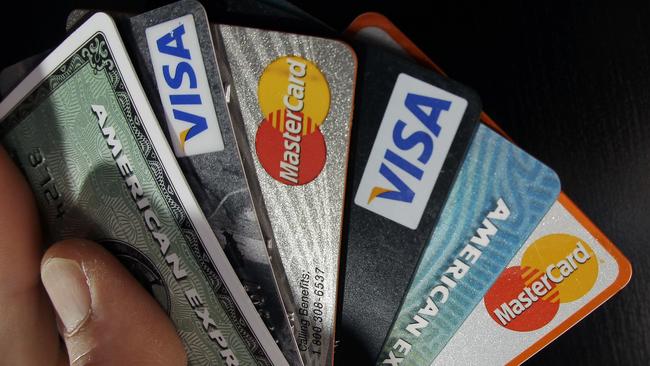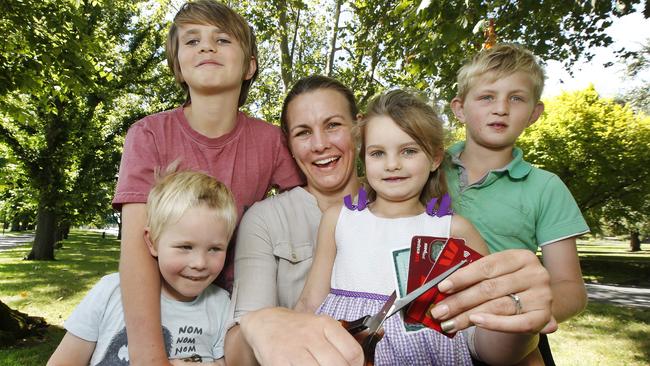Barefoot Investor: How to cut your credit card debt
THERE’S every chance your first credit card worked out about as well as your first foray with vodka. Yet the difference is that a financial hangover can last for years.
Barefoot Investor
Don't miss out on the headlines from Barefoot Investor. Followed categories will be added to My News.
FOR Week 2 of the Barefoot Date Nights Challenge, you’re going to turn the process of paying off your debts into a game of dominoes — it’s the fastest way I know to escape the cult of credit once and for all. Better yet, you’re going to join a new club, where the initiation isn’t a secret handshake but posting pics of your “plastic surgery” ...
THERE’S a good chance your first experience with a credit card worked out about as successfully as your first foray with vodka … passing out in a toilet with vomit all over you.
Yet the difference is that a financial hangover can last for years.
If you only pay off the minimum on a $4400 credit card debt, it’ll take you 42 years to pay off … and $21,080 in interest.
And that’s only if you stop spending money on it.
WEEK 1: ORGANISE YOUR FINANCES AND PUT YOUR MONEY ON AUTOPILOT
In reality, the bank will keep increasing your limit. Which means you can keep spending right through your 20s (and sometimes your 30s, 40s and 50s) without realising just how much you’re being screwed.
And that’s where I come in.
Let’s you and I do a bit of role-play.
You can be the typical Aussie with a typical $4200 credit card debt, and I’ll be the Barefoot Investor.
Here’s me: So, what did you spend the $4200 on?
Here’s you: Havaianas.
Here’s me: As in thongs? Or Cuban cigars? Dude, what the hell are you smoking?
Look, I’ve helped thousands of people get out of debt. Quickly. Painlessly. Without having to feel like they’re setting out on a marathon.
And I’ve never had anyone ever say to me ‘the worst thing I did was pay off my credit cards, you bastard’.

In fact, it’s the opposite. When people cut up their credit card and post a pic on the Barefoot Facebook page, they’re ecstatic! Why? Because they’ve finally stepped off the merry-go-round of misery and made a decision they know they’ll never regret.
Being in debt is often a lonely, isolating experience. You don’t tell your family or friends that you’re struggling to pay off your credit cards, right? It’d be a downer. Embarrassing too. I mean, everyone knows they’re a rip-off! What the hell’s wrong with you?
So you just trudge on, keeping a running balance in your head. Occasionally it goes down, and you get your hopes up … but before long it’s back up to its limit. Most people live like this for their entire working lives, and end up paying the banks the equivalent of a house deposit for the privilege.
You can block it out for a while and pretend it doesn’t matter.
After all, in this country, if you’re normal, you’re broke.
But I’ve never wanted to be normal, and that’s why I cut up my credit cards years ago.
And it was one of the proudest days of my financial life.
The truth is you need to have some ‘no matter whats’ in your life:
· No matter what, I’m not going to take out a high-interest rate loan to fund crap I don’t need.
· No matter what, I’m going to pay my own way, and claw back my financial confidence.
· No matter what, I’m going to set an example for the people around me.
Know this: the moment you say ‘no matter what’ — and really mean it — you no longer have a debt problem. You’re already free.
How to domino your debts
Today you’re going to regain control of your life.
The bottom line is this: if you have a credit card debt, or a personal loan, or a car loan, you’re not in control of your financial future.
Look, I’m not here to judge you.
What I’m here to tell you is that if you’re in debt you’ve already experienced the worst of it. You’re about to regain a feeling of confidence and control. It’s all upwards from here. My method works. It will work for you. And best of all, you’re going to enjoy it.
It’s like playing a game of (Debt) Dominoes.
There’s a bit of work in setting it up, but it’s worth it, because once you’ve lined everything up you’ll find that each debt gets knocked down like a domino, one after the other, automatically.

Let’s do this!
Domino 1: Calculate
The first thing you need to do is line up all your debts — other than your HECS-HELP and your home loan.
Write them all down in a list — credit cards, car loans, parking fines, money you owe to friends. There’s something very powerful about getting stuff out of your head and down on paper.
Domino 2: Negotiate
Now that you’ve calculated all your debts, it’s time to negotiate. Hard.
The first thing to do is grab your statements, ring your bank and try to renegotiate a lower rate on your credit card.
Tell them you have an offer from Citibank of a zero per cent balance transfer for 18 months, with no application fees, no ongoing fees and no transfer fees and you’d like them to match it.
They probably won’t. But chances are they will give you a lower rate on your current deal. Remember, it costs the bank more to acquire a new customer than it does to keep an existing one.
So why shouldn’t you just take the interest-free balance transfer from Citibank for 18 months?
Logically, you should.
However, the reason the banks are able to do something as illogical as give you an 18-month repayment holiday is that they know you’ll probably spend more money on the new card (at a crazy interest rate, after the honeymoon period) and that you won’t pay it off in time.
That’s why I’ve found that for most people it’s better to negotiate a lower rate on your existing cards and pay them off one by one.

Domino 3: Eliminate
It’s time for some plastic surgery. Cut up all your credit cards. Take a photo, and post it on the Barefoot Investor Facebook page. Get ready for an avalanche of ‘likes’.
Domino 4: Detonate
Now it’s time to detonate your debts.
I want you to rearrange your list of debts from smallest to largest.
We’re not focusing on paying off the debt with the highest interest rate first (you should have already negotiated that one down in Domino 2). Instead, we’re focusing on building up your confidence by detonating some debts very quickly.
Now, single out your smallest debt.
It could be a parking fine, or $50 you owe a mate. It could be a credit card. Attack your smallest debt by bumping up the repayments so you can knock it over like a domino as quickly as possible. Focus your attention on knocking this smallest debt over completely.
But remember: while it’s great to put your spare money into paying off your debts fast, always make the minimum repayments on all your debts (such as a monthly payment on your credit card). This will keep the annoying letters (and debt collectors) at bay.
Domino 5: Celebrate!
When that smallest debt is paid in full, hold a bill-burning ceremony.
Seriously, I want you to go out to your backyard (with an alcoholic beverage of your choice) and burn the statement with a lighter. Celebrating is really, really important. You need to give yourself a pat on the back for having a small win. That’s how you build momentum. You’re training your brain to win.
The next day, take your momentum and move on to knocking over your next debt domino.
Keep going till you’ve knocked them all down.
Once you go through the process of lining up your dominoes you’re already free.
Being in debt is not the same as having a debt problem.
Once you begin pushing that first domino, you’re already in control, and you’ll soon be debt free!

THE SCRIPT
How to negotiate a better rate on your credit card
Grab your credit card statements, ring your bank and follow this script:
You: Hello! I’m looking to renegotiate my credit card. Do you have the authority to change my rate? (If they answer ‘no’, say ‘That’s fine, please transfer me to someone who does’.)
You: G’day, my name is _______ . Who am I speaking to?
Bank rep: Derek.
You: Hey Derek! I’ve been a loyal customer of yours for __ years. I’ve decided that it’s time I got on
top of my credit card debt … it’s really depressing me, Derek … you know?
Derek: Oh! Ummm.
You: So, I have an offer from Citibank of a zero per cent balance transfer for 18 months, with no application fees, no ongoing fees and no transfer fees. And I’d like you to match that.
Derek: There’s no way I can do that.
You: Well, I see I’m being charged an annual fee of $__ and __ per cent. What can you do for me,
Derek?
Derek: One moment, please. (Hold music: ‘The Horses’, Daryl Braithwaite.)
Derek: The system is allowing me to waive your annual fee, and I can cut your rate to 9.95 per cent, effective immediately.
You: Thank you, Derek. Bye-bye.

CASE STUDY: BROOKE REARDON
Brooke Reardon and Brad Brotherton had all the ingredients of a happy life — four kids, a nanny, good jobs, a renovated inner-city house and two cars.
But with debts approaching $750,000, they decided to make a change, sold their sunny Toowoomba house in Queensland and moved to Horsham in Victoria without jobs or a solid plan.
“After we spent ten years and working our butts off, it was pretty scary to start again,” Ms Reardon said.
“We paid off every sort of debt we had down to the credit cards and then cut them up and by the time we paid everything off we had nothing left and we were back to square one.”
After three years in Horsham, Ms Reardon has purchased a law franchise with money made available by the financial restructure.
“All of this is because I received the support from what Scott writes and had his fantastic life changing advice — I tell everyone,” she said.
The family rent an old farmhouse and are saving for a 20 per cent mortgage on a house in the country for the life they want to live.

EVERYTHING YOU WANT TO KNOW ABOUT PAYING OFF DEBTS
Should I pay off my HECS-HELP debt?
No, it’ll look after itself.
The government offers a five per cent bonus on voluntary repayments above $500. Your HECS-HELP debt is not charged an interest rate. Instead, each year on 1 June it’s indexed to the cost of living. In 2016 that index rate was a measly 1.5 per cent. And remember, you don’t start making repayments until you earn more than $54,869. Finally, if you croak, the debt dies with you. All up that’s a very sweet deal.
Bottom line: There are better things to do with your money.
What should I do about my car loan?
Get rid of it.
I’m deadly serious. Don’t pay interest on something that’s rapidly falling in value. That doesn’t mean you have to drive your kids around in a Datsun 180B. My rule of thumb is you shouldn’t drive a car that’s worth more than half your annual income. Buy something you can afford … with cash you’ve saved up.
Which credit card should I pay first?
The one with the smallest balance.
Should I consolidate my debts?
Maybe, but if you do, just make sure you only do it through a bank or a credit union (steer clear of infomercial-style spray-on-hair-in-a-can ‘debt solutions’ companies). And understand it’s not a magic wand. What’s keeping you from paying off your debts once and for all is your pattern of spending money. The people who ditch their debts for good have one thing in common: they change their attitude.
Should I worry about what’s on my credit file?
Yes. But don’t get all freaked out about it. Treat it like an annual sexual health check. Each year when you do your tax, you should call credit reporting agency Veda Advantage on 1300 762 207 and request a free copy of your credit report. If there’s anything incorrect on your file, they have the legal obligation to correct it.
Dude, Visa has a hitman looking for me — should I go bankrupt?
I only recommend bankruptcy in the most extreme circumstances.
The only people I trust when it comes to advising on bankruptcy are the independent, not-for-profit financial counsellors at Financial Counselling Australia. Call them on 1800 007 007 and arrange a catch-up.
Edited extract from Scott Pape’s new book, The Barefoot Investor: The only money guide you’ll ever need (Wiley $29.95). Available at all good bookstores and online.
Reader Offer: Buy The Barefoot Investor: the only money guide you’ll ever need for $27.95 including delivery. Order online at heraldsun.com.au/shop or call 1300 306 107. For mail order, post a cheque/money order to: Herald Sun Shop PO Box 14730 Melbourne Vic 8001.


